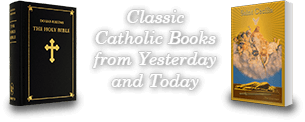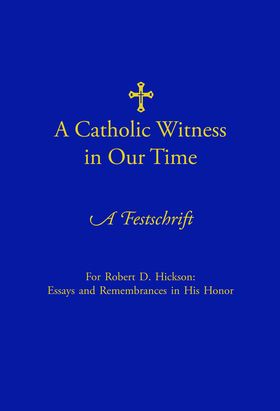Categories
Information
6 x 9 Hardcover 560 Pages- EBOOK - PDF, Kindle, & EPUB
From the moment when Loreto was approached with the proposal to put into print the articles submitted for the Festschrift in honor of Dr. Hickson's 70th birthday I was intrigued, since I have long treasured a rare copy of the Festschrift issued in honor of Hilaire Belloc; the very books referenced in a footnote in this book. Once I had completed my first readiing of the full manuscript I agreed to publish it under the title A Catholic Witness in our Time, since that title precisely describes the variety and depth of the works presented here.
The late 20th and early 21st centuries have been an era of great trial for faithful Catholics. Decay, collapse, self-inflicted auto-demolition and liturgical suicide (to use the words of two 20th century popes), seeming defeat, and (dare we say it) nascent resurrection have characterised our years. This collection of articles is as good a sampling of thought from some of the best Catholic minds and warriors of this period of the Church's history, as may be found anywhere. It will stand for many years as a testament to what we have witnessed, how we have witnessed, and why we have witnessed in our days of exile.
From the Introduction:
In May of 2011, while thinking about my husband Dr. Robert Hickson’s upcoming 70th birthday on 29 December 2012, it came to me that it would be a good idea to celebrate this event as a surprise birthday party together with his family, friends, colleagues and former students. Yet, inasmuch as these friends and others are themselves highly educated, and with engaged minds, it appeared to me the best, to make further good use of their festive coming together at one place, so as to profit from their own knowledge and differentiated reflections by having them give prepared talks at the birthday celebration. This aspect reminded me of the German tradition of the Festschrift, where a University Professor is honored by his friends, colleagues, and students by the gift of a collection of their essays and studies which are in one way or another related to the work of the Professor. I myself was blessed to be able to honor my German doctoral father in this manner.
Contents
Introduction
Section One: The Man
Robert Hickson and His Mentor, Josef Pieper, John M. Haas
Robert D. Hickson, Paladin of Truth, Stephen J. Sniegoski
Soldiers of Misfortune, E. Michael Jones
Gaily into the Dark, Christopher Check
The Catholic Thing and Lost Causes, Gary Potter
The Patriot’s Tale, Charles A. Coulombe
“These Fragments I Have Shored Against My Ruins,” John Vennari
On the Occasion of Professor Robert D. Hickson’s 70th Birthday, Erika Vögeli and Eva-Maria Föllmer-Müller
All That is Gold Does Not Glitter, Douglas Bersaw
Section Two: The Church
A Modest Problem. The Undermining of the Catholic Faith by the Corruption of the Culture, Eugene McGuirk
Savoring Reality. An Introduction to the Childlike Catholic Mind of Brother Francis, Brother André Marie, M.I.C.M.
St. Benedict and the Rule-Giving Office of Fatherhood, William Fahey
Humility and the Great-Souled Man, Peter Chojnowski
Some Reflections on Masonry and its Infiltration into Mainstream Catholic Thought and Teaching Today, Hamilton Reed Armstrong
False Ecumenism, Anthony Fraser
Aide-Memoire on Vatican II, Arnaud de Lassus
Catholicism Reviewed and Corrected by the Synagogue towards the Noachide Religion, Arnaud de Lassus
Pulchritudo Virtutis, Fr. Bernward Wilhelm Deneke, FSSP
Holy Troublemakers, Fr. Stefan Frey, FSSPX
On Friendship, Thomas Fleming
Cicero, St. Augustine, and the Wisdom
and Eloquence of the Christian Preacher, James M. May
Spanish Carlism: An Introduction, Miguel Ayuso
The Gift of Faith, Fr. Robert Nortz
Christian Humanism in the 21st Century, James P. Lucier
Military Strategy and the Church Militant, David W. Lutz
Section Three: The World
Feed My Sheep. A Note on the Painting, Danielle Duhau de Bérenx
The Place of Marshall McLuhan in the Learning of His Times, Mark D. Stahlman
The Virtues of Strategic Patience, Raymond E. Franck
Where is the Victory? The Consequences of Unjust Wars, Harry Veryser
The Orwellian Death of the Just War Principle. Humanitarian Interventionism, Atrocity Prevention and R2P, Jeffrey Steinberg
The Jewish Roots of Modernity, Friedrich Romig
The American Civil Liberties Union, John F. McManus
Healthcare in America, or How to Survive Obamacare in the Corporocratic World, Frederick J. Nahas
Sam Francis, John Reed
Power and Gnosis, Power without Grace, Maike Hickson
Appendix: Remembrances and Greetings from Colleagues, Friends and Former Students
List of Contributors with Curriculum Vitae
Epilogue: A Man of Sorrows
BOOK REVIEW from CHRISTIAN ORDER
In his introduction to this collection of essays honouring the Catholic author and scholar (and father of ten!), Dr. Robert Hickson, the publisher writes: From the moment when Loreto was approached with the proposal to put into print the articles submitted for the Festschrift in honor of Dr. Hickson's 70th birthday I was intrigued, since I have long treasured a rare copy of the Festschrift issued in honor of Hilaire Belloc; the very book referenced in a footnote in this book. Once I had completed my first reading of the full manuscript I agreed to publish it under the title A Catholic Witness in our Time, since that title precisely describes the variety and depth of the works presented here. Many prominent Catholic intellectuals have contributed themes related to Dr. Hickson's unyielding witness both within and without the Church. Part of the early resistance to the doctrinal and liturgical deviations made in the wake of the Second Vatican Council, he has also resisted the increasing militarisation of American foreign policy and its recent wars, especially in his teaching positions within the U.S. military. The heart of his work, though, has always been the affirmation of the Catholic Faith, as embodied in the writings of his mentor Dr. Josef Pieper, as well as in his own deep studies of sacramental Catholic literature. All these themes have found resonance in the book written by his friends, colleagues and former students. Dr. John Haas, Director of the National Bioethics Center in Philadelphia, recounts their mutual admiration of and friendship with Dr. Josef Pieper, pointing out the essential parts of Church doctrine closest to Dr. Hickson's heart: the Teaching on Divine Grace; gravely neglected by the Church in recent decades. Dr. Michael E. Jones dwells on Robert Hickson as a military man and his Vietnam experience as a young West Point and Special Forces Officer. He shows how this generation of well-bred men with high ideals has been disillusioned and disappointed with the cynical foreign policy of their country that finally abandons those whom they first attempted to help in distress, namely the Catholic South Vietnamese. Dr. Jones also touches upon the troubled relationship between Dr. Hickson and the Catholic institution he helped establish, Christendom College, which might, at its foundation, have been too closely connected with politics. Dr. Steve Sniegoski recounts and summarises Dr. Hickson's well-articulated critique of U.S. foreign policy; the wars against Iraq and Afghanistan in particular. From his own experience working with Dr. Hickson for the government, he reveals how Dr. Hickson has always put witness to the truth first, even at the risk of losing his professional position. Alongside that part of the book concerned with his personal witness, two other sections deal with "The Church" and "The World" independently of Dr. Hickson; developing themes he has worked on himself. Mr. Reed Armstrong, a renowned sculptor, describes how the ideas of Freemasonry have found their way into the Catholic mainstream — exemplified by the Society of Jesus, especially the writings of Teilhard de Chardin. As a prime example of just how deeply freemasonic thoughts have infiltrated the Church, he quotes from a foreword written for a major occultist book by none other than Hans Urs von Balthasar, the late ex-Jesuit exalted by recent popes and leading neo-conservative clerics and laymen. Deacon Gene McGuirk traces the weakening of the Church's teaching on modesty in dress, especially for women, and how major masonic texts have proclaimed precisely that goal. He shows that the undermining of Catholic morals, especially of chastity, were aimed at weakening the Faith and its practise. Two eminent European Catholic traditional writers, the Scottish author Anthony S. Fraser of happy memory, and French scholar Arnaud de Lassus, together form the centre of the section on "The Church." In calm and detailed fashion, both authors show the deviations from traditional Catholic teaching in different fields in the last decades: notably teachings concerned with Ecumenism, Religious Liberty, and the validity of the First Covenant with the Jewish people. In all these areas, they demonstrate how the recent teaching of the Church has departed from the age-old traditional teaching, as also found in Sacred Scripture. Indicative of the range of subjects covered is the comprehensive overview of the Carlist movement in Spain, provided by the eminent Spanish scholar, Dr. Miguel Ayuso. He details its historical roots; goals and yearnings; failures; weaknesses; and its enduring validity in our day. Carlism, he explains, is a whole way of life, a world view intertwined with the practice of the Faith and a monarchical ideal for society. Though it has little chance of success at the current time, it presents nonetheless a lasting ideal, awaiting better times. In the section on "The World," the writings of three U.S. American authors — General Raymond Franck, Harry Veryser and Jeffrey Steinberg — stand out: all discussing their country's foreign policy, especially its war policy. Each distances himself from the hasty and feverish aggressivity with which the U.S. has waged wars against enemies, while discussing the grave consequences for the morality of the country, the life of its civilians abroad, as well as its international reputation. Taken as a whole, the Festschrift is a summary of the mind and work of a traditional Catholic scholar who has taken his stand in the above-mentioned fields. Any reader, whether familiar with Dr. Hickson or not, will profit from its great variety of topics, presented by (mostly Catholic) American and European scholars of high learning and moral character. As the publisher truly states in his introductory note: The late 20th and early 21st centuries have been an era of great trial for faithful Catholics. Decay, collapse, self-inflicted autodemolition and liturgical suicide (to use the words of two 20th century popes), seeming defeat, and (dare we say it) nascent resurrection have characterised our years. This collection of articles is as good a sampling of thought from some of the best Catholic minds and warriors of this period of the Church's history, as may be found anywhere. It will stand for many years as a testament to what we have witnessed, how we have witnessed, and why we have witnessed in our days of exile.
No posts found



